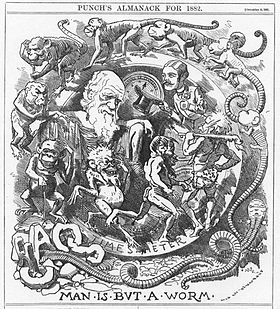
| Part of a series on | ||||
| Creationism | ||||
|---|---|---|---|---|
 | ||||
| History | ||||
| Types | ||||
| Biblical cosmology | ||||
| Creation science | ||||
| Rejection of evolution by religious groups | ||||
| Religious views | ||||
|
||||
| Part of a series on |
| Evolutionary biology |
|---|
 |
Recurring cultural, political, and theological rejection of evolution by religious groups[a] exists regarding the origins of the Earth, of humanity, and of other life. In accordance with creationism, species were once widely believed to be fixed products of divine creation, but since the mid-19th century, evolution by natural selection has been established by the scientific community as an empirical scientific fact.
Any such debate is universally considered religious, not scientific, by professional scientific organizations worldwide: in the scientific community, evolution is accepted as fact,[1] and efforts to sustain the traditional view are universally regarded as pseudoscience.[2][3][4] While the controversy has a long history,[5][6] today it has retreated to be mainly over what constitutes good science education,[7][8] with the politics of creationism primarily focusing on the teaching of creationism in public education.[9][10][11][12][13] Among majority-Christian countries, the debate is most prominent in the United States,[14] where it may be portrayed as part of a culture war.[15][16] Parallel controversies also exist in some other religious communities, such as the more fundamentalist branches of Judaism[17] and Islam.[18] In Europe and elsewhere, creationism is less widespread (notably, the Catholic Church and Anglican Communion both accept evolution), and there is much less pressure to teach it as fact.
Christian fundamentalists reject the evidence of common descent of humans and other animals as demonstrated in modern paleontology, genetics, histology and cladistics and those other sub-disciplines which are based upon the conclusions of modern evolutionary biology, geology, cosmology, and other related fields. They argue for the Abrahamic accounts of creation, and, in order to attempt to gain a place alongside evolutionary biology in the science classroom, have developed a rhetorical framework of "creation science". In the landmark Kitzmiller v. Dover, the purported basis of scientific creationism was judged to be a wholly religious construct without scientific merit.
The Catholic Church holds no official position on creation or evolution (see Evolution and the Catholic Church). However, Pope Francis has stated: "God is not a demiurge or a magician, but the Creator who brought everything to life...Evolution in nature is not inconsistent with the notion of creation, because evolution requires the creation of beings that evolve."[19][20][21] The rules of genetic inheritance were discovered by the Augustinian friar Gregor Mendel, who is known today as the founder of modern genetics.
Cite error: There are <ref group=lower-alpha> tags or {{efn}} templates on this page, but the references will not show without a {{reflist|group=lower-alpha}} template or {{notelist}} template (see the help page).
- ^ IAP Member Academies 2006.
- ^ AAAS Board of Directors 2006.
- ^ Kitzmiller v. Dover Area School District, 04 cv 2688 (M.D. Pa. December 20, 2005). Whether ID Is Science, p. 83.
- ^ Larson 2004, p. 258.
- ^ Numbers 1992, pp. 3–240.
- ^ Montgomery 2012.
- ^ Peters, Ted; Hewlett, Martinez (December 22, 2005). "The Evolution Controversy: Who's Fighting with Whom about What?" (PDF). Pacific Lutheran Theological Seminary. Berkeley, CA. Evolution Brief E2. Archived from the original (PDF) on November 29, 2010. Retrieved August 27, 2014.
- ^ Kitzmiller v. Dover Area School District, 04 cv 2688 (M.D. Pa. December 20, 2005). Context, p. 20.
- ^ Slevin, Peter (March 14, 2005). "Battle on Teaching Evolution Sharpens". The Washington Post. p. A01. Retrieved August 27, 2014.
- ^ Renka, Russell D. (November 16, 2005). "The Political Design of Intelligent Design". Renka's Home Page. Round Rock, TX. Archived from the original on April 11, 2018. Retrieved August 27, 2014.
- ^ Wilgoren, Jodi (August 21, 2005). "Politicized Scholars Put Evolution on the Defensive". The New York Times. Retrieved August 27, 2014.
- ^ Forrest, Barbara (April 2002). "The Newest Evolution of Creationism". Natural History. 111 (3): 80. ISSN 0028-0712. Retrieved June 6, 2014.
- ^ Kitzmiller v. Dover Area School District, 04 cv 2688 (M.D. Pa. December 20, 2005). Introduction, pp. 7–9, also Whether ID Is Science, pp. 64–89, and Promoting Religion, p. 90.
- ^ Miller, Jon; Scott, Eugenie; Okamoto, Shinji (September 1, 2006). "Public Acceptance of Evolution". Science. 313 (5788): 765–766. doi:10.1126/science.1126746. PMID 16902112. S2CID 152990938.
- ^ Larson 2004, pp. 247–263, Chapter 11: "Modern Culture Wars".
- ^ Ruse 1999, p. 26.
- ^ Cantor & Swetlitz 2006.
- ^ Cite error: The named reference
BurtonIRNKSAwas invoked but never defined (see the help page). - ^ Welsh, Teresa (October 28, 2014). "Pope Francis Says Science and Faith Aren't At Odds". USA Today. Retrieved October 20, 2017.
- ^ McKenna, Josephine (October 28, 2014). "Pope says evolution, Big Bang are real". USA Today. Tysons Corner, VA: Gannett Company. Religion News Service. Retrieved January 28, 2016.
- ^ Gordon, Kara (October 30, 2014). "The Pope's Views on Evolution Haven't Really Evolved". The Atlantic. Washington, D.C.: Atlantic Media. ISSN 1072-7825. Retrieved January 28, 2016.